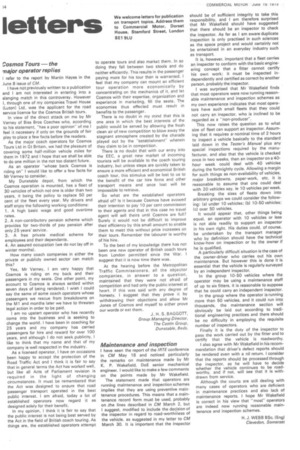Maintenance and inspection
Page 56

If you've noticed an error in this article please click here to report it so we can fix it.
I have seen the report of the IRTE conference in CM May 18 and noticed particularly the remarks on maintenance made by Mr K. P. Wakefield, DoE senior mechanical engineer. I would like to make a few comments on the points made by Mr Wakefield.
The statement made that operators are running maintenance and inspection schemes implies that they are using preventive maintenance procedures. This means that a maintenance record form must be used, probably on the lines described in CM March 2, but I suggest, modified to include the decision of the inspector in regard to road-worthiness of the vehicle, as suggested in my letter to CM March 30. It is important that the inspector
should be of sufficient integrity to take this responsibility, and I am therefore surprised that Mr Wakefield should have suggested that there should be an inspector to check the inspector. As far as I am aware duplicate inspection is only practised in such sciences as the space project and would certainly not be entertained in an everyday industry such as transport.
It is, however, important that a fleet carries an inspector to conform with the basic engineering concept that a fitter cannot certify his own work; it must be inspected independently and certified as correct by another person, probably the inspector.
I was surprised that Mr Wakefield finds that most operators were now running reasonable maintenance and inspection schemes as my own experience indicates that most operators have such small fleets that they could not carry an inspector, who is inclined to be regarded as a "non-producer".
This now raises the question as to what size of fleet can support an inspector. Assuming that it requires a, nominal time of 2 hours to inspect a vehicle basically to the standard laid down in the Tester's Manual plus any special inspections required by the manufacturer, and also that the vehicle is checked once in two weeks, then an inspector on a 40hour week could deal with 40 vehicles during the fortnightly cycle. Allowing a margin for such things as non-availability of vehicles, major breakdowns, paper-work, etc, it is reasonable to assume that one could deal with 20 vehicles say, ie 10 vehicles per week.
Breaking the sizes of fleets down into arbitrary groups we could consider the following: (a) under 10 vehicles; (3) 10-50 vehicles: (c) over 50 vehicles.
It would appear that, other things being equal, an operator with 10 vehicles or less is not able readily to support an inspector in his own right. His duties could, of course, be undertaken by the transport manager who by definition should have the technical know-how on inspection or by the owner if he is qualified.
A particularly difficult situation is the case of the owner-driver who carries out his own maintenance. But however this is done it is essential that the vehicle is regularly surveyed by an independent inspector.
In the group 10-50 vehicles where the operator may be using a maintenance staff of up to six fitters, it is reasonable to suppose that he could carry an independent inspector.
In the group where the operator is running more than 50 vehicles, and it could run into thousands, the maintenance section will obviously be laid out according to traditional engineering practices and there should be no difficulty in employing the requisite number of inspectors.
Finally it is the duty of the inspector to pass the work carried out by the fitter and to certify that the vehicle is roadworthy.
I also agree with Mr Wakefield in his recommendation that driver's defect reports should be rendered even with a nil return. I consider that the reports should be processed through the inspector, as he will have to decide whether the vehicle continues to be roadworthy, and if not, will see that it is withdrawn from service, Although the courts are still dealing with many cases of operators who are deficient in maintenance practices and also lack of maintenance reports, I hope Mr Wakefield is correct in his view that "most" operators are indeed now running reasonable maintenance and inspection schemes.
H. J. WEBB BSc, (Eng) Cievedon, Somerset












































































































































